Local Court Visit Report: Comparing Mount Druitt and UK Courts
VerifiedAdded on 2022/09/09
|5
|1068
|17
Report
AI Summary
This report details a student's visit to the Mount Druitt Local Court on March 5, 2020, comparing it to the English court system. The report outlines the court's structure, the types of cases heard (primarily less complex civil and criminal matters), and the absence of juries. The student observed court proceedings, including a case where an annulment conviction application was rejected due to lack of sufficient evidence. The report highlights differences between the Mount Druitt Local Court and UK County Courts, particularly in civil case handling and judicial roles. The conclusion emphasizes the importance of a judge's knowledge, impartiality, and unbiased application of law and evidence in adjudication. The report references relevant sources and provides a comparative analysis of the two court systems.
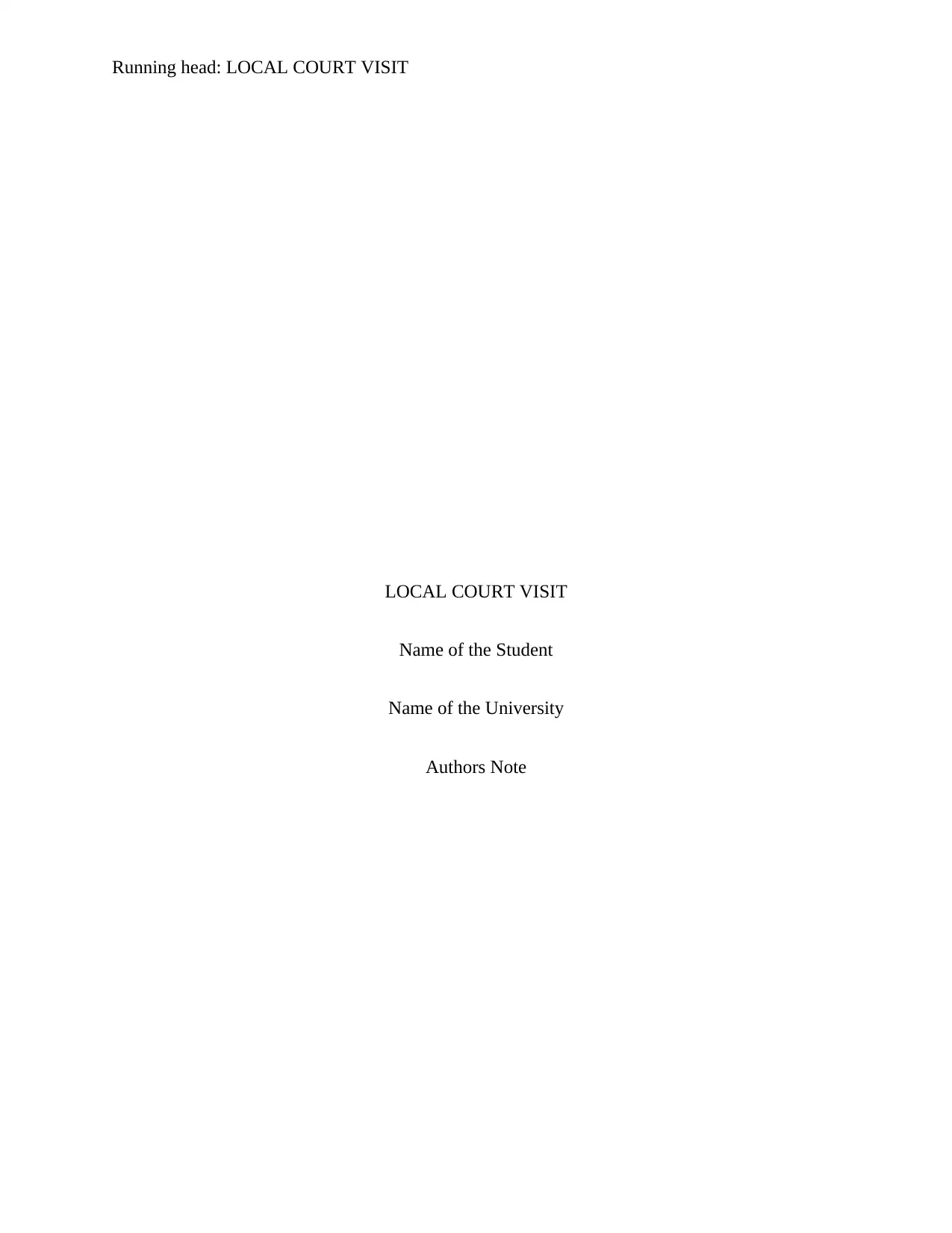
Running head: LOCAL COURT VISIT
LOCAL COURT VISIT
Name of the Student
Name of the University
Authors Note
LOCAL COURT VISIT
Name of the Student
Name of the University
Authors Note
Paraphrase This Document
Need a fresh take? Get an instant paraphrase of this document with our AI Paraphraser
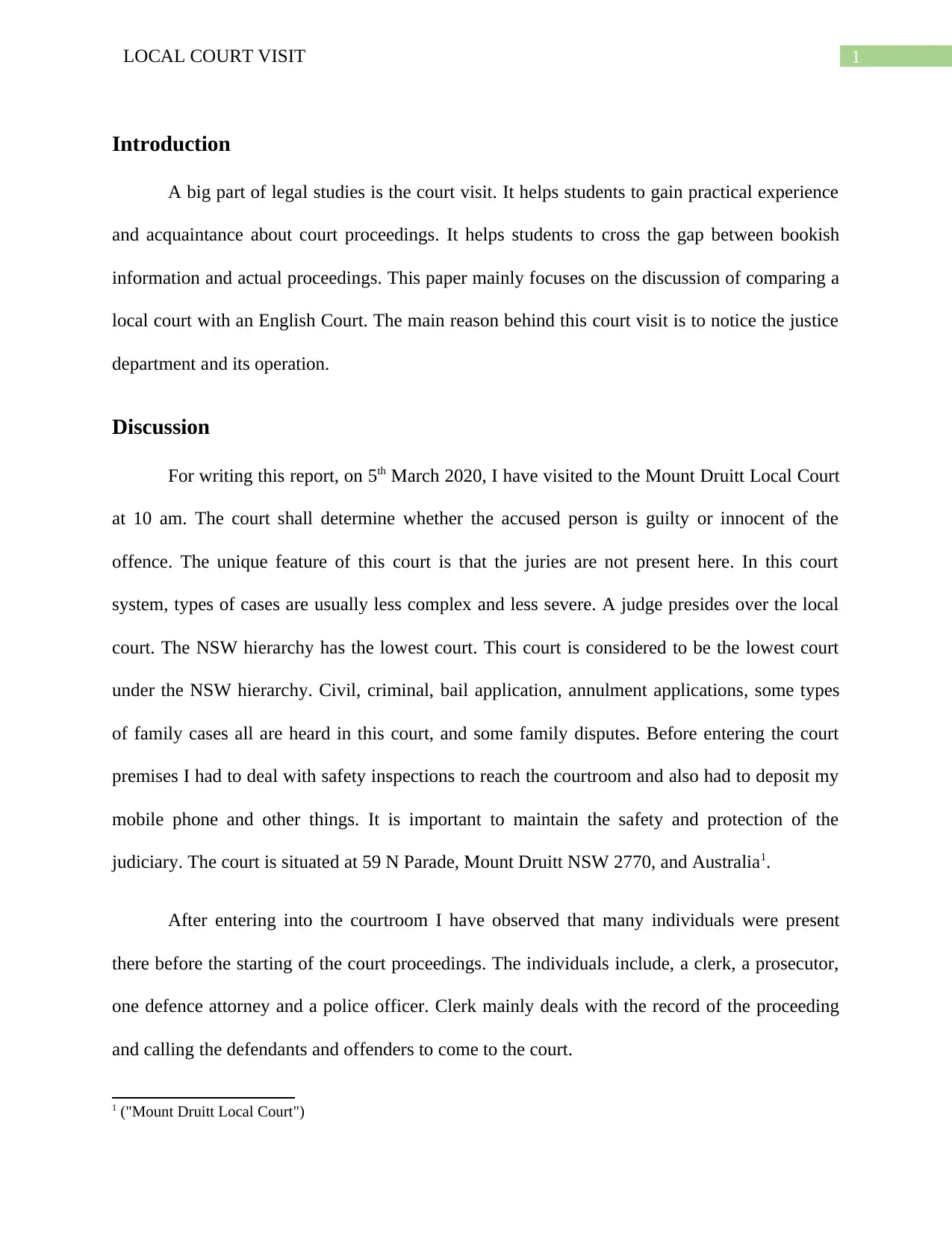
1LOCAL COURT VISIT
Introduction
A big part of legal studies is the court visit. It helps students to gain practical experience
and acquaintance about court proceedings. It helps students to cross the gap between bookish
information and actual proceedings. This paper mainly focuses on the discussion of comparing a
local court with an English Court. The main reason behind this court visit is to notice the justice
department and its operation.
Discussion
For writing this report, on 5th March 2020, I have visited to the Mount Druitt Local Court
at 10 am. The court shall determine whether the accused person is guilty or innocent of the
offence. The unique feature of this court is that the juries are not present here. In this court
system, types of cases are usually less complex and less severe. A judge presides over the local
court. The NSW hierarchy has the lowest court. This court is considered to be the lowest court
under the NSW hierarchy. Civil, criminal, bail application, annulment applications, some types
of family cases all are heard in this court, and some family disputes. Before entering the court
premises I had to deal with safety inspections to reach the courtroom and also had to deposit my
mobile phone and other things. It is important to maintain the safety and protection of the
judiciary. The court is situated at 59 N Parade, Mount Druitt NSW 2770, and Australia1.
After entering into the courtroom I have observed that many individuals were present
there before the starting of the court proceedings. The individuals include, a clerk, a prosecutor,
one defence attorney and a police officer. Clerk mainly deals with the record of the proceeding
and calling the defendants and offenders to come to the court.
1 ("Mount Druitt Local Court")
Introduction
A big part of legal studies is the court visit. It helps students to gain practical experience
and acquaintance about court proceedings. It helps students to cross the gap between bookish
information and actual proceedings. This paper mainly focuses on the discussion of comparing a
local court with an English Court. The main reason behind this court visit is to notice the justice
department and its operation.
Discussion
For writing this report, on 5th March 2020, I have visited to the Mount Druitt Local Court
at 10 am. The court shall determine whether the accused person is guilty or innocent of the
offence. The unique feature of this court is that the juries are not present here. In this court
system, types of cases are usually less complex and less severe. A judge presides over the local
court. The NSW hierarchy has the lowest court. This court is considered to be the lowest court
under the NSW hierarchy. Civil, criminal, bail application, annulment applications, some types
of family cases all are heard in this court, and some family disputes. Before entering the court
premises I had to deal with safety inspections to reach the courtroom and also had to deposit my
mobile phone and other things. It is important to maintain the safety and protection of the
judiciary. The court is situated at 59 N Parade, Mount Druitt NSW 2770, and Australia1.
After entering into the courtroom I have observed that many individuals were present
there before the starting of the court proceedings. The individuals include, a clerk, a prosecutor,
one defence attorney and a police officer. Clerk mainly deals with the record of the proceeding
and calling the defendants and offenders to come to the court.
1 ("Mount Druitt Local Court")
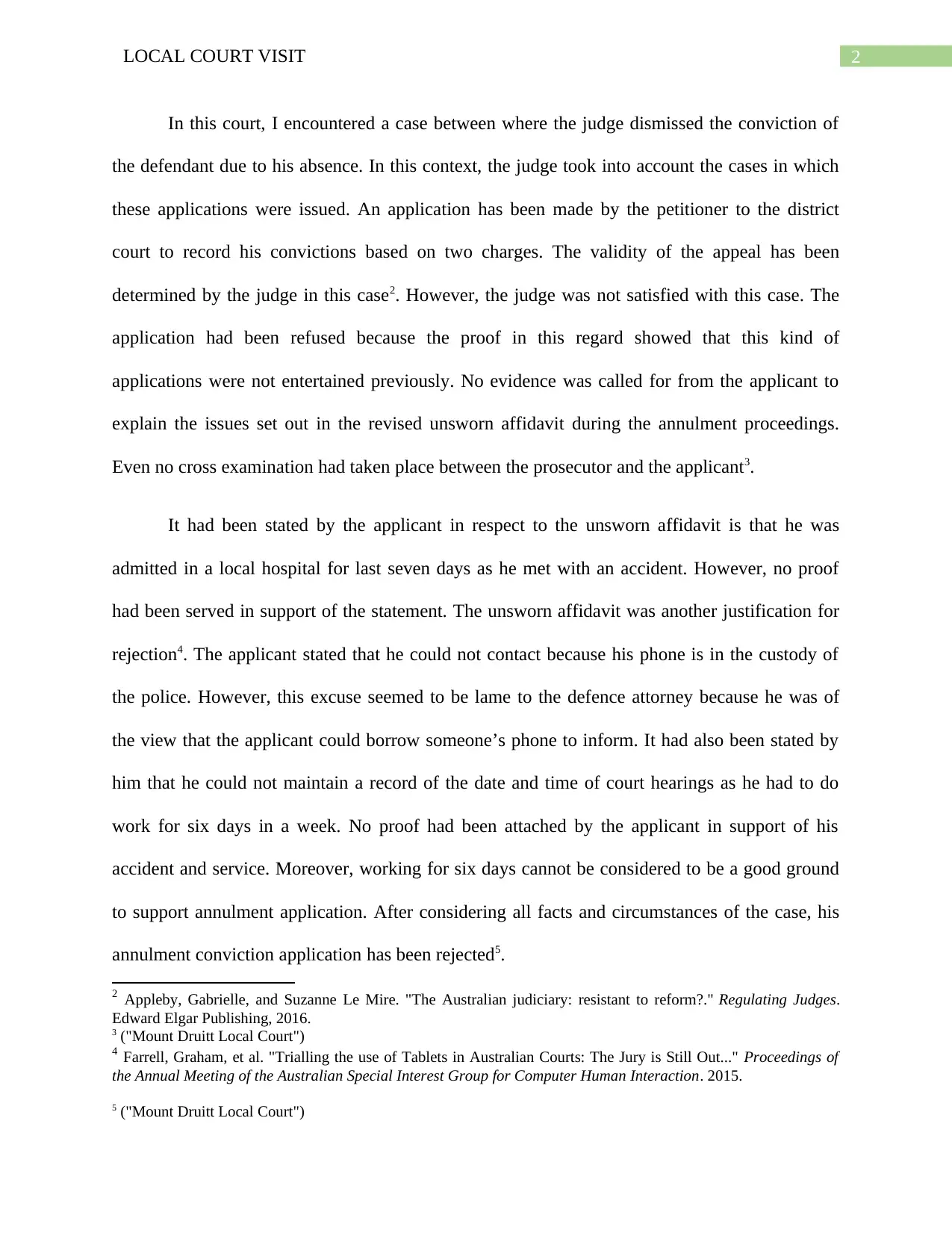
2LOCAL COURT VISIT
In this court, I encountered a case between where the judge dismissed the conviction of
the defendant due to his absence. In this context, the judge took into account the cases in which
these applications were issued. An application has been made by the petitioner to the district
court to record his convictions based on two charges. The validity of the appeal has been
determined by the judge in this case2. However, the judge was not satisfied with this case. The
application had been refused because the proof in this regard showed that this kind of
applications were not entertained previously. No evidence was called for from the applicant to
explain the issues set out in the revised unsworn affidavit during the annulment proceedings.
Even no cross examination had taken place between the prosecutor and the applicant3.
It had been stated by the applicant in respect to the unsworn affidavit is that he was
admitted in a local hospital for last seven days as he met with an accident. However, no proof
had been served in support of the statement. The unsworn affidavit was another justification for
rejection4. The applicant stated that he could not contact because his phone is in the custody of
the police. However, this excuse seemed to be lame to the defence attorney because he was of
the view that the applicant could borrow someone’s phone to inform. It had also been stated by
him that he could not maintain a record of the date and time of court hearings as he had to do
work for six days in a week. No proof had been attached by the applicant in support of his
accident and service. Moreover, working for six days cannot be considered to be a good ground
to support annulment application. After considering all facts and circumstances of the case, his
annulment conviction application has been rejected5.
2 Appleby, Gabrielle, and Suzanne Le Mire. "The Australian judiciary: resistant to reform?." Regulating Judges.
Edward Elgar Publishing, 2016.
3 ("Mount Druitt Local Court")
4 Farrell, Graham, et al. "Trialling the use of Tablets in Australian Courts: The Jury is Still Out..." Proceedings of
the Annual Meeting of the Australian Special Interest Group for Computer Human Interaction. 2015.
5 ("Mount Druitt Local Court")
In this court, I encountered a case between where the judge dismissed the conviction of
the defendant due to his absence. In this context, the judge took into account the cases in which
these applications were issued. An application has been made by the petitioner to the district
court to record his convictions based on two charges. The validity of the appeal has been
determined by the judge in this case2. However, the judge was not satisfied with this case. The
application had been refused because the proof in this regard showed that this kind of
applications were not entertained previously. No evidence was called for from the applicant to
explain the issues set out in the revised unsworn affidavit during the annulment proceedings.
Even no cross examination had taken place between the prosecutor and the applicant3.
It had been stated by the applicant in respect to the unsworn affidavit is that he was
admitted in a local hospital for last seven days as he met with an accident. However, no proof
had been served in support of the statement. The unsworn affidavit was another justification for
rejection4. The applicant stated that he could not contact because his phone is in the custody of
the police. However, this excuse seemed to be lame to the defence attorney because he was of
the view that the applicant could borrow someone’s phone to inform. It had also been stated by
him that he could not maintain a record of the date and time of court hearings as he had to do
work for six days in a week. No proof had been attached by the applicant in support of his
accident and service. Moreover, working for six days cannot be considered to be a good ground
to support annulment application. After considering all facts and circumstances of the case, his
annulment conviction application has been rejected5.
2 Appleby, Gabrielle, and Suzanne Le Mire. "The Australian judiciary: resistant to reform?." Regulating Judges.
Edward Elgar Publishing, 2016.
3 ("Mount Druitt Local Court")
4 Farrell, Graham, et al. "Trialling the use of Tablets in Australian Courts: The Jury is Still Out..." Proceedings of
the Annual Meeting of the Australian Special Interest Group for Computer Human Interaction. 2015.
5 ("Mount Druitt Local Court")
⊘ This is a preview!⊘
Do you want full access?
Subscribe today to unlock all pages.

Trusted by 1+ million students worldwide
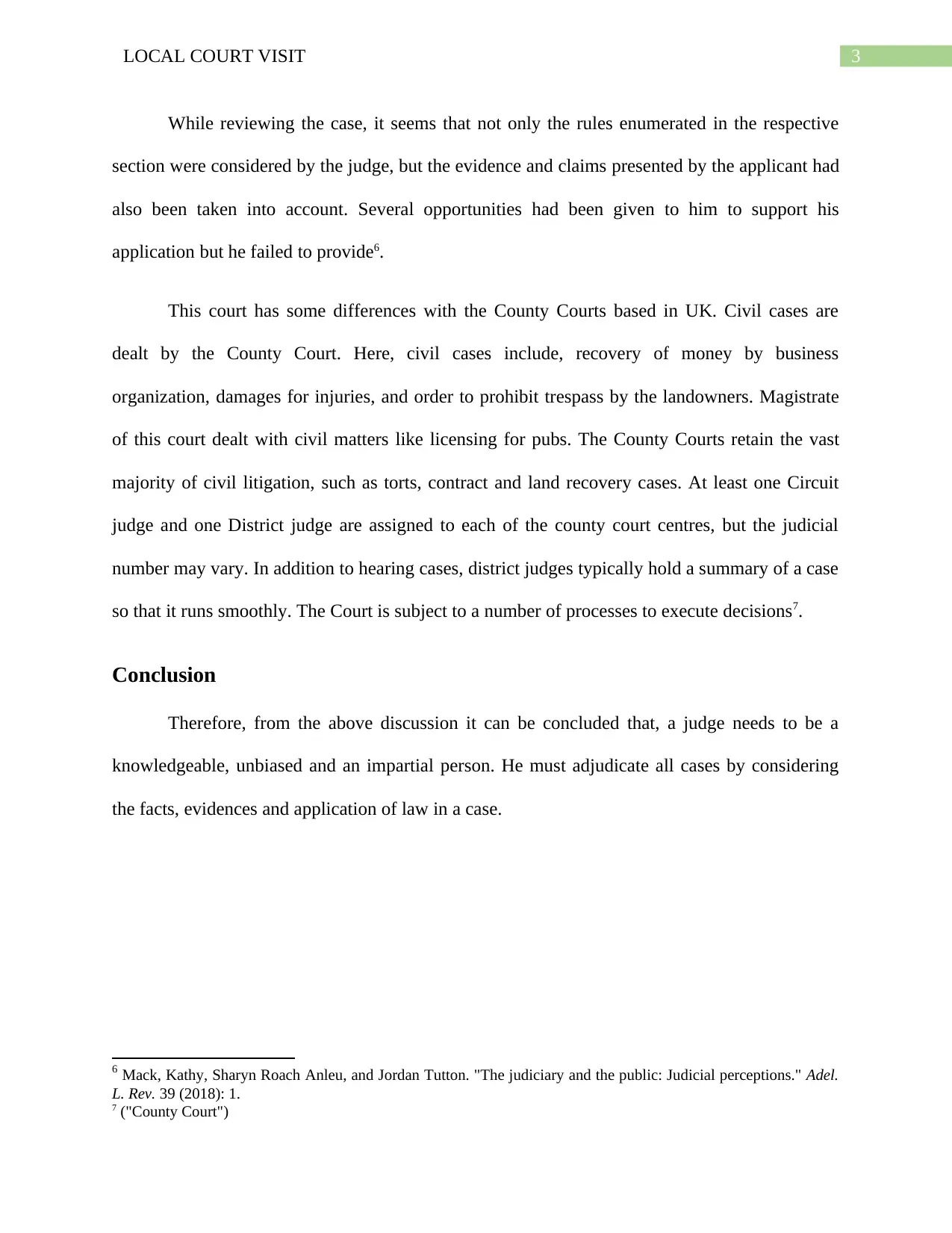
3LOCAL COURT VISIT
While reviewing the case, it seems that not only the rules enumerated in the respective
section were considered by the judge, but the evidence and claims presented by the applicant had
also been taken into account. Several opportunities had been given to him to support his
application but he failed to provide6.
This court has some differences with the County Courts based in UK. Civil cases are
dealt by the County Court. Here, civil cases include, recovery of money by business
organization, damages for injuries, and order to prohibit trespass by the landowners. Magistrate
of this court dealt with civil matters like licensing for pubs. The County Courts retain the vast
majority of civil litigation, such as torts, contract and land recovery cases. At least one Circuit
judge and one District judge are assigned to each of the county court centres, but the judicial
number may vary. In addition to hearing cases, district judges typically hold a summary of a case
so that it runs smoothly. The Court is subject to a number of processes to execute decisions7.
Conclusion
Therefore, from the above discussion it can be concluded that, a judge needs to be a
knowledgeable, unbiased and an impartial person. He must adjudicate all cases by considering
the facts, evidences and application of law in a case.
6 Mack, Kathy, Sharyn Roach Anleu, and Jordan Tutton. "The judiciary and the public: Judicial perceptions." Adel.
L. Rev. 39 (2018): 1.
7 ("County Court")
While reviewing the case, it seems that not only the rules enumerated in the respective
section were considered by the judge, but the evidence and claims presented by the applicant had
also been taken into account. Several opportunities had been given to him to support his
application but he failed to provide6.
This court has some differences with the County Courts based in UK. Civil cases are
dealt by the County Court. Here, civil cases include, recovery of money by business
organization, damages for injuries, and order to prohibit trespass by the landowners. Magistrate
of this court dealt with civil matters like licensing for pubs. The County Courts retain the vast
majority of civil litigation, such as torts, contract and land recovery cases. At least one Circuit
judge and one District judge are assigned to each of the county court centres, but the judicial
number may vary. In addition to hearing cases, district judges typically hold a summary of a case
so that it runs smoothly. The Court is subject to a number of processes to execute decisions7.
Conclusion
Therefore, from the above discussion it can be concluded that, a judge needs to be a
knowledgeable, unbiased and an impartial person. He must adjudicate all cases by considering
the facts, evidences and application of law in a case.
6 Mack, Kathy, Sharyn Roach Anleu, and Jordan Tutton. "The judiciary and the public: Judicial perceptions." Adel.
L. Rev. 39 (2018): 1.
7 ("County Court")
Paraphrase This Document
Need a fresh take? Get an instant paraphrase of this document with our AI Paraphraser
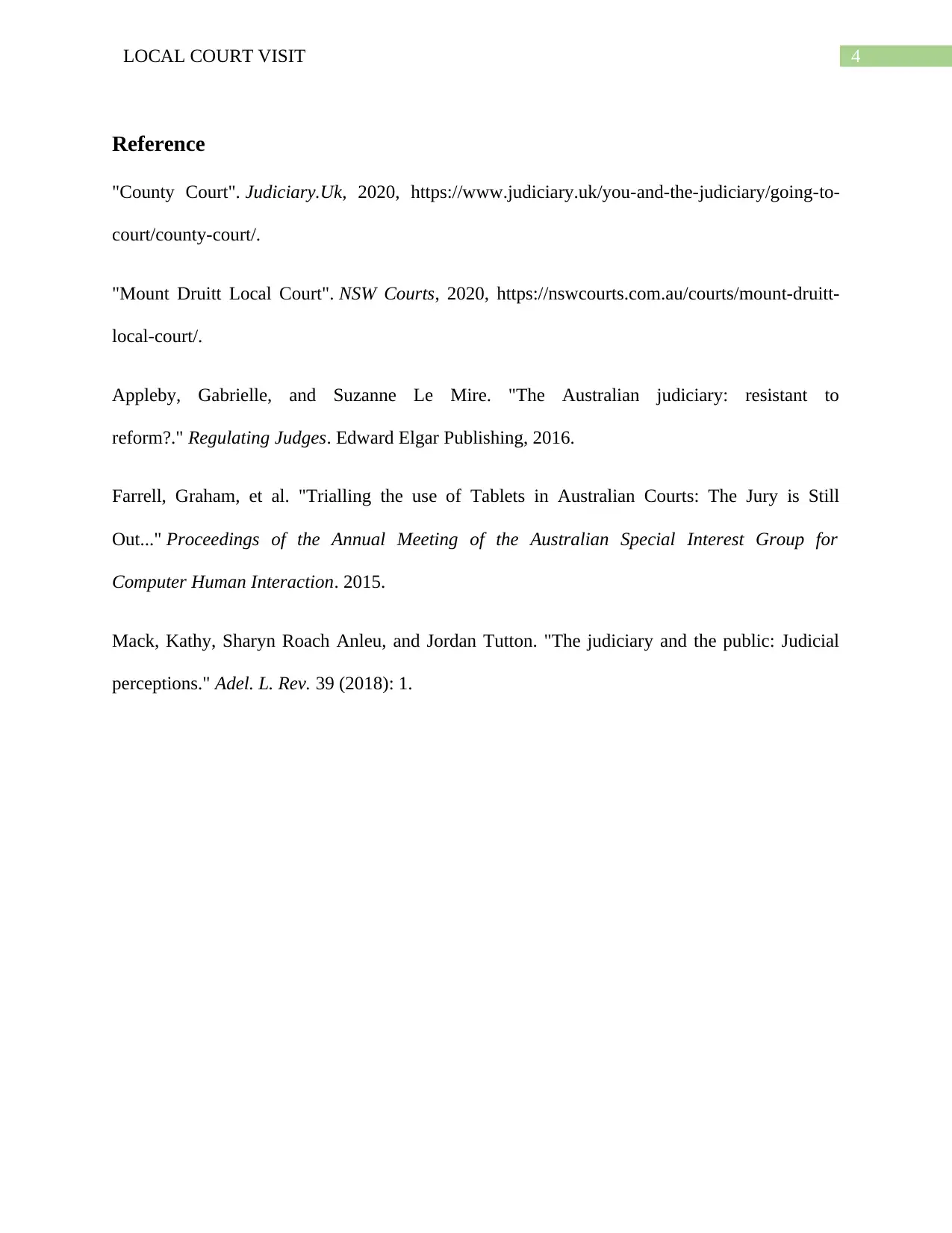
4LOCAL COURT VISIT
Reference
"County Court". Judiciary.Uk, 2020, https://www.judiciary.uk/you-and-the-judiciary/going-to-
court/county-court/.
"Mount Druitt Local Court". NSW Courts, 2020, https://nswcourts.com.au/courts/mount-druitt-
local-court/.
Appleby, Gabrielle, and Suzanne Le Mire. "The Australian judiciary: resistant to
reform?." Regulating Judges. Edward Elgar Publishing, 2016.
Farrell, Graham, et al. "Trialling the use of Tablets in Australian Courts: The Jury is Still
Out..." Proceedings of the Annual Meeting of the Australian Special Interest Group for
Computer Human Interaction. 2015.
Mack, Kathy, Sharyn Roach Anleu, and Jordan Tutton. "The judiciary and the public: Judicial
perceptions." Adel. L. Rev. 39 (2018): 1.
Reference
"County Court". Judiciary.Uk, 2020, https://www.judiciary.uk/you-and-the-judiciary/going-to-
court/county-court/.
"Mount Druitt Local Court". NSW Courts, 2020, https://nswcourts.com.au/courts/mount-druitt-
local-court/.
Appleby, Gabrielle, and Suzanne Le Mire. "The Australian judiciary: resistant to
reform?." Regulating Judges. Edward Elgar Publishing, 2016.
Farrell, Graham, et al. "Trialling the use of Tablets in Australian Courts: The Jury is Still
Out..." Proceedings of the Annual Meeting of the Australian Special Interest Group for
Computer Human Interaction. 2015.
Mack, Kathy, Sharyn Roach Anleu, and Jordan Tutton. "The judiciary and the public: Judicial
perceptions." Adel. L. Rev. 39 (2018): 1.
1 out of 5
Your All-in-One AI-Powered Toolkit for Academic Success.
+13062052269
info@desklib.com
Available 24*7 on WhatsApp / Email
![[object Object]](/_next/static/media/star-bottom.7253800d.svg)
Unlock your academic potential
Copyright © 2020–2026 A2Z Services. All Rights Reserved. Developed and managed by ZUCOL.

